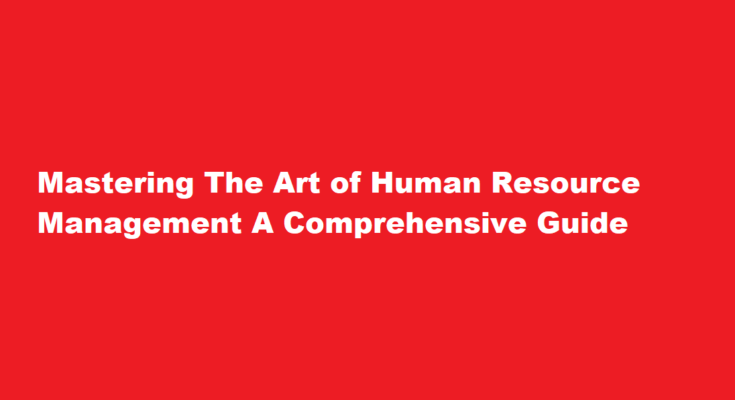Introduction
In today’s dynamic business landscape, the role of a Human Resource Manager (HRM) is pivotal in ensuring an organization’s success. HR managers are not just responsible for recruitment and payroll. they play a crucial role in shaping company culture, fostering employee development, and resolving conflicts. To be an effective HR manager, one must possess a diverse skill set, combining both soft and technical skills. In this article, we will delve into the key aspects of becoming a successful HR manager, offering insights and guidance to those aspiring to excel in this rewarding profession.
Understand the Business
A vital aspect of being an exceptional HR manager is having a deep understanding of the business you work for. This means comprehending its goals, values, industry dynamics, and challenges. The more you know about the company, the better equipped you are to align HR strategies with organizational objectives. Regularly engage with different departments and employees to gain insights into their needs and concerns. This insight will allow you to create HR policies and initiatives that resonate with the company’s vision, fostering a more cohesive and productive work environment.
Develop Strong Communication Skills
Effective communication is the cornerstone of HR management. HR managers need to communicate clearly and empathetically with employees, management, and stakeholders. Whether it’s conducting interviews, giving feedback, or resolving conflicts, your ability to listen actively and express yourself clearly is crucial. Additionally, staying up-to-date with the latest communication tools and platforms can enhance your efficiency and accessibility.
Master Recruitment and Selection
Recruitment and selection are integral to HR management. Developing a keen eye for identifying talent, designing effective job descriptions, and conducting rigorous interviews is essential. You must also understand the legal and ethical aspects of hiring, including diversity and inclusion practices. By building a robust recruitment process, you can attract the right talent, which is vital for an organization’s growth and success.
Employee Development and Training
Investing in employee development and training is a win-win strategy for both HR managers and the organization. Designing and implementing training programs that align with career paths and organizational goals not only enhances employee skills but also fosters loyalty and retention. Keep abreast of industry trends to ensure your training programs remain relevant. Regularly assess employee performance and provide constructive feedback to guide their professional growth.
Conflict Resolution and Mediation
Conflict is inevitable in any workplace. As an HR manager, your ability to mediate disputes and find amicable solutions is invaluable. To be effective, develop strong conflict resolution skills, which include active listening, empathy, and impartiality. Create a safe space for employees to voice their concerns and work towards creating an atmosphere of trust and fairness. Adept conflict resolution not only maintains a harmonious workplace but also saves the company from costly legal issues.
Stay Informed About Employment Laws
Employment laws and regulations are constantly evolving. To protect both employees and the organization, HR managers must stay informed about local, state, and federal labor laws. This includes areas such as labor rights, anti-discrimination policies, wage and hour laws, and workplace safety regulations. Regularly update your HR policies and procedures to remain compliant and reduce legal risks.
Embrace Technology
In the digital age, technology plays a pivotal role in HR management. Familiarize yourself with HR software and tools for tasks such as payroll processing, performance management, and applicant tracking. Leveraging technology can streamline administrative tasks, allowing you to focus on more strategic HR functions. Moreover, understanding data analytics can help you make informed decisions, predict employee trends, and optimize HR processes.
Cultivate Empathy and Emotional Intelligence
Empathy and emotional intelligence are essential qualities for HR managers. Understanding the emotional needs of employees and demonstrating compassion in challenging situations can enhance employee satisfaction and engagement. Moreover, empathy can improve your ability to build trust and rapport with colleagues and staff. Emotional intelligence allows you to navigate the complexities of human interactions with finesse, making you a more effective leader in HR management.
Frequently Asked Questions
Why should we hire you as HR manager?
“I should be hired for this role because of my relevant skills, experience, and passion for the industry. I’ve researched the company and can add value to its growth. My positive attitude, work ethics, and long-term goals align with the job requirements, making me a committed and valuable asset to the company.”
What is the role of HR?
What is an HR department? In simplest terms, the HR (Human Resources) department is a group who is responsible for managing the employee life cycle (i.e., recruiting, hiring, onboarding, training, and firing employees) and administering employee benefits.
Conclusion
Being a Human Resource Manager is more than just a job; it’s a multifaceted profession that requires a blend of skills and qualities. By understanding the organization, honing your communication skills, excelling in recruitment, nurturing employee development, mastering conflict resolution, staying legally compliant, embracing technology, and cultivating empathy and emotional intelligence, you can become an outstanding HR manager. Your role is pivotal in shaping the workplace culture, fostering employee growth, and ultimately contributing to the organization’s success. Remember, continuous learning and adaptability are the keys to thriving in this ever-evolving field.
Read Also : A Guide to Pursuing a Career in Hotel Management



